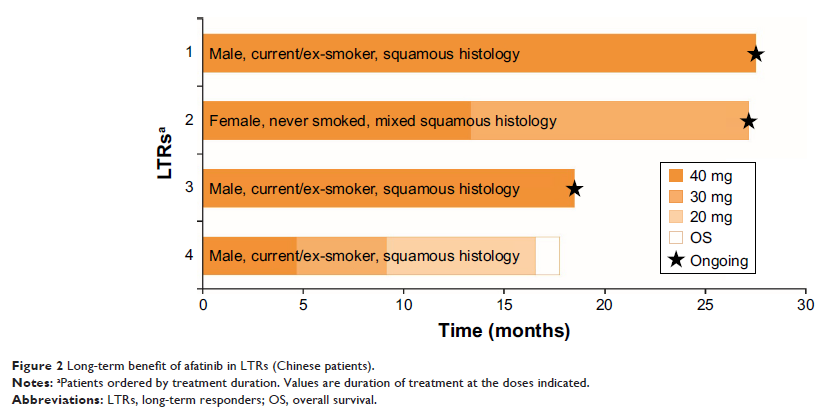109906
论文已发表
注册即可获取德孚的最新动态
IF 收录期刊
- 3.4 Breast Cancer (Dove Med Press)
- 3.2 Clin Epidemiol
- 2.6 Cancer Manag Res
- 2.9 Infect Drug Resist
- 3.7 Clin Interv Aging
- 5.1 Drug Des Dev Ther
- 3.1 Int J Chronic Obstr
- 6.6 Int J Nanomed
- 2.6 Int J Women's Health
- 2.9 Neuropsych Dis Treat
- 2.8 OncoTargets Ther
- 2.0 Patient Prefer Adher
- 2.2 Ther Clin Risk Manag
- 2.5 J Pain Res
- 3.0 Diabet Metab Synd Ob
- 3.2 Psychol Res Behav Ma
- 3.4 Nat Sci Sleep
- 1.8 Pharmgenomics Pers Med
- 2.0 Risk Manag Healthc Policy
- 4.1 J Inflamm Res
- 2.0 Int J Gen Med
- 3.4 J Hepatocell Carcinoma
- 3.0 J Asthma Allergy
- 2.2 Clin Cosmet Investig Dermatol
- 2.4 J Multidiscip Healthc

Afatinib vs erlotinib for second-line treatment of Chinese patients with advanced squamous cell carcinoma of the lung
Authors Lu S, Li W, Zhou C, Hu CP, Qin S, Cheng G, Feng J, Wang J, Cseh A, Peil B, Gibson N, Ehrnrooth E, Zhang L
Received 6 January 2018
Accepted for publication 8 May 2018
Published 30 November 2018 Volume 2018:11 Pages 8565—8573
DOI https://doi.org/10.2147/OTT.S161506
Checked for plagiarism Yes
Review by Single-blind
Peer reviewers approved by Dr Cristina Weinberg
Peer reviewer comments 2
Editor who approved publication: Dr Samir Farghaly
Background: The global Phase III LUX-Lung 8 trial
(ClinicalTrials.gov: NCT01523587) identified significant improvements in
progression-free survival (PFS), overall survival (OS), and patient-reported
outcomes (PROs) with second-line afatinib vs erlotinib in patients with
advanced squamous cell carcinoma (SCC) of the lung.
Materials
and methods: We conducted a post hoc analysis
of data for patients in LUX-Lung 8 from mainland China (n=67). Compared with
erlotinib, afatinib reduced the risk of disease progression or death (PFS) in
the Chinese subgroup by 30% (HR=0.70; 95% CI: 0.38–1.27).
Results: The
risk of death was reduced by 31% (HR=0.69; 95% CI: 0.39–1.21). The proportion
of Chinese patients with improvements in PROs also favored afatinib vs
erlotinib (global health status/quality of life [QoL], 52.8% vs 29.6%, P =0.072; dyspnea,
47% vs 26%, P =0.091; “dyspnea walked”, 44% vs 15%, P =0.017; QoL rate,
53% vs 26%, P =0.037).
Discussion: While this analysis was not powered to demonstrate differences compared
to the overall trial population (OTP), and there were some differences in
baseline characteristics (eg, the proportion of patients aged ≥65 years old),
the benefits of afatinib treatment in Chinese patients with SCC of the lung
appeared to be at least comparable to that observed in LUX-Lung 8. As with the
OTP, the most common adverse events (AEs) with afatinib in the Chinese subgroup
were diarrhea and rash/acne, and the incidence and type of the most frequently
occurring AEs were similar.
Conclusion: The
results suggest that afatinib represents a feasible treatment option for
Chinese patients with advanced SCC of the lung following progression on
platinum-based chemotherapy.
Keywords: afatinib,
NSCLC, squamous cell carcinoma, second-line, Phase III, Chinese patients
